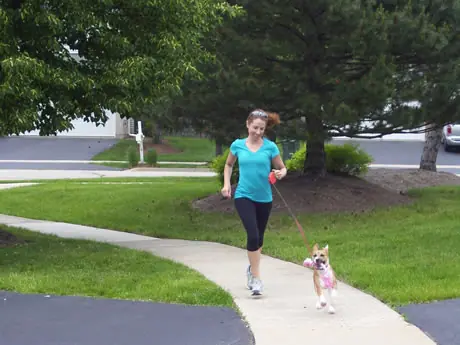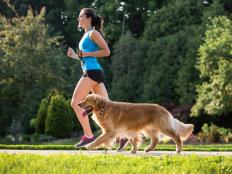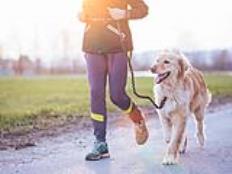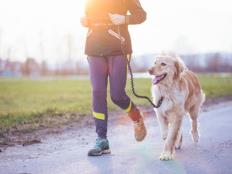17. Introduce elevation and hills.
This is the same process as introducing trails. Monitor the transition closely, and listen to your dog's body (bet you never heard that one before). Stop if your dog needs to stop. Chances are your dog will probably adjust faster than you can.
18. Introduce higher mileage.
I used the same endurance-focused technique to build Ginger's mileage. Speed didn't matter, only time on her feet. When she got tired, we recovered and continued. We did this until she was comfortable running 20-mile distances without stopping.
More: 27 Ways to Run Better Everyday
19. Consider nutrition
If you're going to be on the trail long enough, your dog may need to eat. We are still experimenting with different foods for Ginger, but we try to give her some mix of carbs and protein. I have read of dogs eating anything and everything on a trail, from Cheezits to beef jerkey.
For the most part, we let Ginger tell us what she likes and doesn't like. Interestingly, she loves pizza (hard to carry on a trail) but will also eat whatever we're eating, from sandwiches to burritos.
On our last long run, I shared a bean and rice burrito with Ginger. At home, we feed her raw meat as well as high-quality, grain-free dog food. Sometimes Ginger's diet is healthier than our own.
20. Introduce back-to-back runs.
Back-to-back long runs were key for my own ultra training, so that's where we headed with Ginger. Her recovery is impressive, and she has now caught up to my own training. We start to break down at about the same mileage, and we recover at around the same time. I've created the perfect running partner.
Immeasurable Benefits
1. BFF-status
Your dog can become your most loyal running buddy and bring out the fiercest loyalty in you. You'll look out for each other and understand each other's needs. I've passed up human races in favor of doggie-friendly events because I didn't want to put Ginger up in a doggie-hotel. Sometimes I'd rather bust out a long run with her.
More: 3 Steps to Long-Run Recovery
2. Safety
Any run that I do with Ginger is safer. She's not an aggressive dog, but I know that if danger calls, she'd step up and defend me. I also know that her mere presence is a deterrent.
I am never approached when Ginger is with me, whereas when I run alone I sometimes get comments, cars slowing down, or some lingering. Recently I was running in the dark with Ginger and I saw a man cross to the other side of the road to avoid us.
3. Fun and enjoyment
Dogs know how to appreciate trails. They frolic. They sprint. They stand out over a lookout and gaze. Watching them teaches you to appreciate the trails. It reminds you where you are and why you're here.
On roads, Ginger can be clumsy and careless (she once ran into a brick wall), but on the trails she moves with grace while I stumble along.
Here's an exerpt from the book How to Talk to Your Animals, which outlines the similarities between wolves and dogs as far as movement and behavior in a natural setting:
"In the woods I need not ask him to sit when we come to the top of the hill in view of the glorious Hudson. He glances at me, then the vista, sits down, and, like myself, gazes across the river valley. Only a few weeks ago we were on a new trail that opened up over a lake. Qimmiq lanced back at me, ran to the ridge, and sat down.
'You're right, it is beautiful,' I said. He wagged is tail.
His wild kin, the wolves of Mount McKinley, dig their dens high on hills in view of gray-green valleys and snow-covered peaks. And they, like Qimmiq and me, sit and enjoy the magnificence.
At such moments the glance from either of us will say a volume, and the abyss between species is crossed from both sides."
More: Video Highlights From a Dog 5K
 Find a dog-friendly event in your area.
Find a dog-friendly event in your area.
- 5
- of
- 5
About the Author

Get ACTIVE on the Go


Couch to 5K®
The best way to get new runners off the couch and across the finish line of their first 5K.
Available for iOS | Android







Discuss This Article